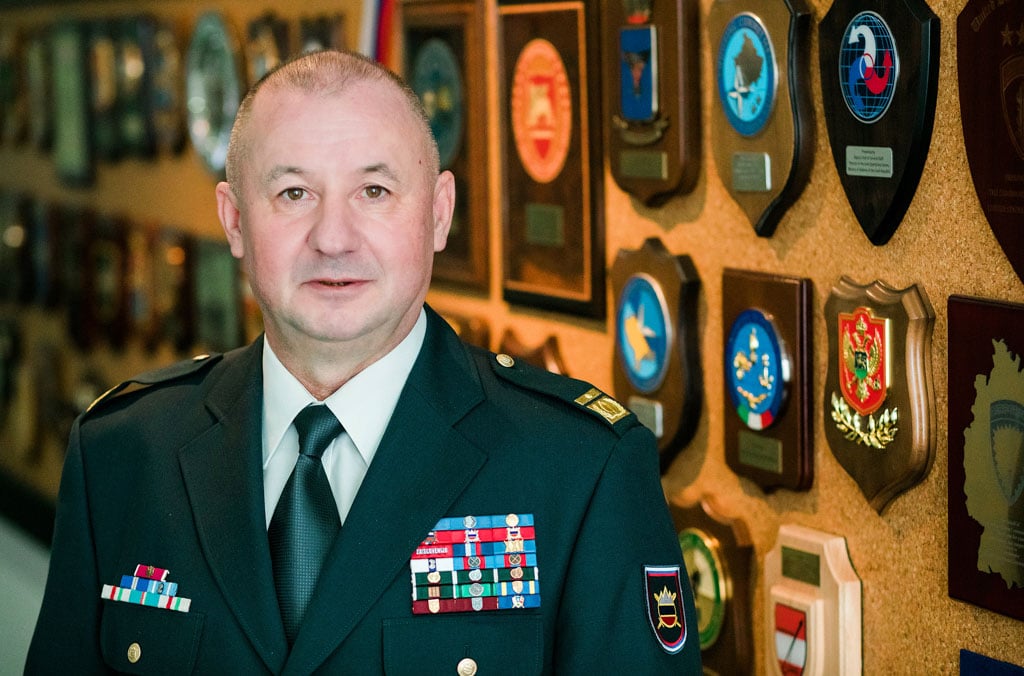Since its “depoliticisation,” the national media outlet Radio-Television Slovenia (RTVS) has been producing daily news programmes along the lines of the “non-aligned” ones, as former minister Žiga Turk noted. The shows Dnevnik (Daily News), Odmevi (Echoes), Zrcalo tedna (Mirror of the Week), Utrip (Pulse) are not only internal political agitprop agitation for socialism, but the foreign policy priorities in these shows are very clearly set as well: advocacy for “peace” in Ukraine (read: disarmament of Ukraine), pro-Palestinian in terms of the terrorist attack on Israel, anti-Western, anti-capitalist reporting. Everything is in its place. But recently, Miha Škerbinc, a Major-General of the Slovenian army and a professor at the prestigious George C. Marshall European Centre for Security Studies, has spoken out against this.
In a recent episode of the show Ogledalo tedna, they also commented on the NATO Secretary General’s statement as “the empty words of a toothless tiger that no one takes seriously anymore.” Škerbinc reacted to the reports by saying, “The oldest, the biggest, the strongest alliance that still exists. Who is not taking it seriously? Things would be very bad – or will be very bad – if this really happens. When deterrence falls, all that is left is defence. I suggest that RTV Slovenia starts sending its journalists to serious schools and that it corrects such inept and foolish statements.”
But of course, this was no mistake. The anti-NATO rhetoric is one of the central characteristics of Slovenian left-wing journalists, whose epicentre is precisely RTV Slovenia. NATO represents everything they hate – the integration of the capitalist countries of the free world against the egalitarian totalitarianisms of this world, to which they swear allegiance. NATO is one of the main obstacles that is still preventing them from realising their dream of the autocracy in which they (or their fathers and grandfathers) grew up.
Let’s think back to one of the Wikileaks dispatches, where the USA Ambassador in 2006 expressed concerns about the Slovenian media (most of the major dailies were left-leaning at the time) being “unbalanced”, and then-President of the Republic Drnovšek confirmed this, saying that he himself had problems with the media in the country. He pointed out the irony that in the 1980s, Slovenian journalists were against the policies of the former Yugoslavia and were mostly Western-oriented. The personalities of these journalists have since turned 180 degrees, back to “Yugonostalgia”.
On the other hand, Drnovšek described as positive the fact that Kučan‘s departure from the political scene had benefited the situation in the media world. Kučan was said to have repeatedly interfered and put pressure on the media.
A return to the days of Kučan
We are clearly living in “Kučan’s” times again, as Kučan’s hard-left rhetoric has become an everyday feature of our media landscape. And the anti-NATO rhetoric is also part of this. Let us remind you of the protest at the start of the Ukrainian war, which was organised under the patronage of Kučan and another former President of the Republic, Danilo Türk. The banners were not directed against Russia but instead called on NATO to withdraw from the war zone as soon as possible. At that time – early 2022 – this was still the position of the biggest extremists – of course, from Kučan’s circle. Today, Kučan’s rhetoric against the West, the USA, NATO, and, of course, Israel is the official political position of the public broadcaster RTV Slovenia.
Škerbinc may be thinking that such rhetoric is the result of poor schools and lack of education. But in reality, it is just the opposite. It is a deliberate media tactic with clear political objectives.
M. I.


